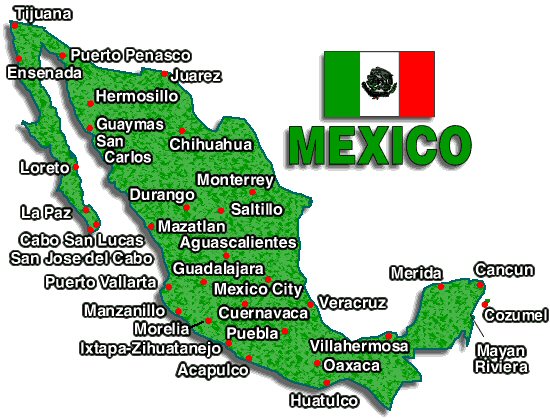Mexico
is rapidly becoming one of the most popular countries
for Americans, Europeans and other foreign nationals
to purchase vacation homes. While Mexico real estate
can be a lucrative investment, some foreign investors
may feel uneasy about buying "south of the
border."
Here's
what you need to know about purchasing property
in Mexico as well as some general information about
the country.
Buying
Property in Mexico
Q: Can citizens of countries
other than Mexico buy and own real estate in Mexico?
A: Yes, citizens of countries other than Mexico
can purchase property in Mexico by placing the property
in a bank trust, also known as Fideicomiso.
Q: Can foreigners own real
estate near Mexico's borders or on near the ocean?
A: The Mexican Constitution previously banned foreign
nationals from owning property that was within what
has come to be known as the "restricted zone."
The restricted zone encompasses all land located
within about 62 miles of any Mexican border, and
within about 31 miles of any Mexican coastline.
This old law was intended to protect Mexican land
from foreign invasion.

Because
the constitution could not be altered, the Mexican
government
introduced a system called the "fideicomiso,"
(FEE-DAY-E-CO-ME-SO) which is, roughly translated,
a real estate trust, so that foreign nationals could
invest in property inside the restricted zones.
The trust holds the deeds to the property, and the
buyer and/or other named persons which the buyer
specifies are sole beneficiaries to the trust (and
therefore the property). The beneficiary has full
rights to do whatever he likes with the property:
it can be developed (in accordance with local planning
regulations), rented, leased, sold, or given away.
In other words, the buyer own the property in all
but name.
Unlike
some countries, buyers do not have to be residents
in Mexico to own property there, so there is no
need to qualify for resident status under immigration
laws. The trust enables the buyer to name a beneficiary
upon his death.
Mexican
Law on property ownership is comprehensive and provides
protection for the seller and the buyer in all property
transactions, provided that the law is followed
and all necessary documentation is created.
Q:
How does the trust work?
A: The property's title is submitted to a trust
with a Mexican bank, whereby the bank acts as trustee.
The trust is formalized with a permit from Mexico's
Ministry of Foreign Affairs. The home buyer is named
as beneficiary. The beneficiary's rights are recorded
in the public record by a notary public.
Q: Who is involved in a
bank trust?
A: Three parties - The seller of the property is
the "trustor," the bank is the "trustee,"
and the buyer, is known as the "beneficiary"
or Fideicomiso.
Q: How much does it cost
to set up a bank trust?
 A: Banks charge buyers an initial fee of roughly
$500 USD for writing the agreement
and establishing the trust. A percentage based on
the property's value is then added on. Also, the
bank charges an annual fee based on the value of
the property to cover its services as trustee.
A: Banks charge buyers an initial fee of roughly
$500 USD for writing the agreement
and establishing the trust. A percentage based on
the property's value is then added on. Also, the
bank charges an annual fee based on the value of
the property to cover its services as trustee.
Q: What are the buyer's
rights?
A: The trust is a legal substitute for what is commonly
known as fee simple ownership, but in many cases,
the trustee is the legal holder of the property.
Beneficiaries have the right to sell the property
without any restrictions. They can also transfer
their rights to a third party or pass it on to heirs
through a formal will.
Q: Is the trust renewable?
A: Yes. Foreign Investment Law passed in 1993 allows
trusts to be renewed for an indefinite number of
50 year periods. It is essentially infinitely renewable.
The
beneficiary (buyer/owner) has a contractual right
under the trust agreement with the Mexican bank
to all benefits that may result from the use or
sale of that property, even though he does not officially
hold title to the property.
A
real estate trust is not a lease. The beneficiary
can instruct the bank to sell or lease the property
at any time. The beneficiary can develop and use
the property to his liking and benefit, within the
provisions of the law.
Generally,
Mexican law allows most activities engaged in by
foreigners. The bank, as trustee, has a fiduciary
obligation to respect the rights of the beneficiary.

Q. What professionals are
required to complete a real estate transaction in
Mexico?
A: Typically there are four players involved: 1)
a real estate company, 2) The buyer or the buyer's
attorney, 3) a bank, and 4) a notary public, a government
appointed lawyer who processes, reviews and certifies
all official documents to ensure the property transfer
of the property.
Q: What documents are needed
to purchase property in Mexico?
A: Much of the paperwork is similar to that used
in the U.S. The documents required by law to purchase
property in Mexico include a non-lien certificate
based on a title search from the Public Property
Registry, a statement from the municipality regarding
property assessments, water bills, and other pertinent
taxes that might be due, and finally, an appraisal
of the property for tax purposes.
Q: If a foreign national
decides to sell the property, are there restrictions
on who he can sell it to?
A: There are no restrictions. If the buyer is also
a foreigner, the seller simply assigns the beneficial
rights to that person. The foreigner automatically
receives his own renewal 50-year permit, as opposed
to the balance remaining of the seller's 50-year
period. If the new buyer is a Mexican national,
the seller can tell the bank to endorse the title
in the buyer's name.
Q: Who pays the closing
costs when buying or selling a property in Mexico?
A: It is common for the buyer to pay the transfer
of acquisition tax and all other closing costs,
including the notary's fees and expenses. The seller
typically pays capital gains tax and the real estate
broker's commission.
Q: How much is the transfer
tax?
A: The real estate transfer tax is usually between
1% and 4% of the tax appraisal value, which is typically
less than the sales value.
Q: How much are closing
costs?
 A: The rest of the closing costs, excluding the
transfer taxes, vary from 3% to 5% of the appraised
tax value. These percentages are applied to whichever
is greatest of: 1) the sale price of the property,
2) the official tax appraisal value, or 3) the value
determined by property assessment authorities.
A: The rest of the closing costs, excluding the
transfer taxes, vary from 3% to 5% of the appraised
tax value. These percentages are applied to whichever
is greatest of: 1) the sale price of the property,
2) the official tax appraisal value, or 3) the value
determined by property assessment authorities.
Q. Is title insurance available
in Mexico?
A: Yes, it's available and recommended. The insurer
will research the title to the property and ensure
that it is free and clear. Should anybody ever dispute
that title, the buyer will have an advocate who
will defend his claim in the local courts. Rates
range from about $5 to $7 per $1,000 of coverage,
depending on the value of the property and the individual
firm.
Q. Is financing available
for foreigners buying property in Mexico?
A: Foreigners can get financing from a Mexico lender,
and often developers have specific companies that
they can recommend and that have pre-approved the
project. U.S. lenders are just starting to offer
loans on property in Mexico, and more U.S. lenders
are expected to soon join the market. Buyers should
discuss financing options with their realtor and
the developer of the property that they're buying.
General
Information About Mexico
Q. Where is Mexico located relative to the U.S.
and the rest of the world?
A. Mexico is located north of Central America, between
Guatemala and the US
Q. How big is Mexico?
A. Mexico spans 761,606 square miles - nearly three
time the size of Texas. The country also boasts
over 5,797 miles of coastline.

Q. What is the capital of
Mexico?
A. Mexico City is the country's capital and is located
centrally within the country.
Q. What kind of money do
they use in Mexico?
A. Mexico uses the Peso, which equals roughly $.09
USD.
Q. What is Mexico's climate?
A. Mexico has been graced with an unusually temperate
climate year-round. Keep in mind that the Mexican
summer is also rainy season, although rain rarely
lasts more than a few hours, and typically starts
in the late afternoon.
Temperature
extremes are present only in the North and in Baja,
where the temperature can rise above 100F.
Mexico
City has a year-round temperature in the high 80s,
while the coasts usually stay in the mid-90s. Temperatures
fall somewhat at night, but rarely go down below
a 60F.
Q. What are some popular
destinations in Mexico?
A. Cancun, Acapulco, Mazatlan, and Puerto Vallarta
as well as Baja California are all popular. The
beaches are among the best in the world, however,
there are also plenty of destinations inland as
well.
Q. What's the population
of Mexico?
A. Mexico has approximately 109 million people and
a 1.97% growth rate. Life expectancy for Mexicans
is roughly 73 years for men and 78 years for women.
Q. Are there any religious
influences in Mexico?
A. Yes. A large portion of the population is Roman
Catholic (89%) while only 6% of the population is
Protestant.
Q. Are Mexicans well educated?
A. 87% of the population (age 15 and over) can read
and write.
Q. As a citizen of another
country, am I exempt from Mexican Law?
A. No. Regardless of your country of citizenship,
 whenever you are on Mexican soil, you are bound
by Mexican law.
whenever you are on Mexican soil, you are bound
by Mexican law.
Q. Is Mexico the country's
official name?
A. No, Mexico is officially known as United Mexican
States (Estados Unidos Mexicanos in Spanish), but
is conventionally referred to as Mexico.
Q. What kind of government
does Mexico have?
A. Mexico is a federal republic operating under
one centralized government.
Q. Does Mexico have states
like the U.S.?
A. Mexico is broken down into 31 states and one
federal district.
Q. What kind of legal system
does Mexico have?
A. Mexico has adopted a mixture of United States
constitutional theory and civil law system.
Q. Is Spanish the only language
spoken in Mexico?
A.
Although Spanish is the most widely spoken language
in México, there are over 60 indigenous languages
and dialects, including Mayan (the ancient language
of the Maya) and Nahuatl (the language of the Aztecs),
spoken as the every day language in many places
in México.
Q. Does Mexico celebrate
any national holidays?
A. Mexico's national holiday is Independence Day,
celebrated on September 16 to recognize the country's
independence in 1810.
Q. Describe Mexico's economy.
A. Mexico's economy is a mix of government-owned
industrial facilities (notably oil), privately-owned
manufacturing and services, as well as large-scale
and traditional agriculture. Mexico's largest trading
partner is the U.S., making up three-quarters of
the nation's imports and exports. The country's
largest producers of foreign exchange are petroleum,
vehicle assembly and tourism.
Q. What are the roads like
in Mexico?
A. Mexico has a mix of paved, semi-paved and cobblestone
roads. The vast majority of major cities, resort
and residential areas have paved roads.
Are you interested in purchasing
a second home in Mexico? To see what's available,
visit our Featured
Properties of Mexico.
*
The information above is general background about
purchasing property in Mexico and is not meant as
a substitute for the advice of your attorney or
accountant, who can take into consideration your
individual situation.